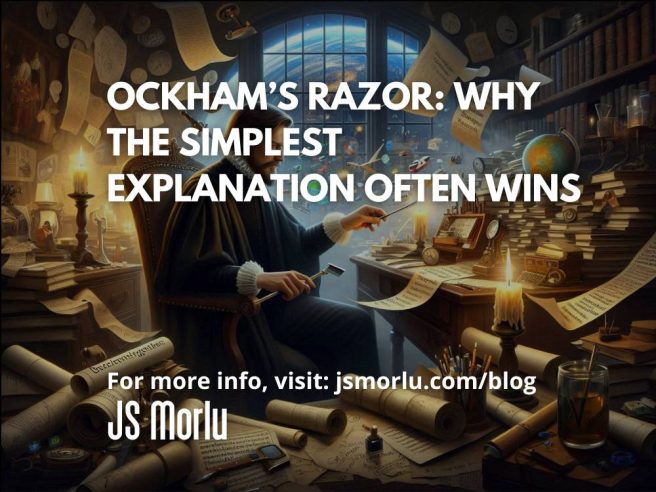By: John S. Morlu II, CPA
The Core Principle
Ockham’s razor (often spelled Occam’s razor) is a principle of reasoning named after the 14th-century English philosopher and Franciscan friar William of Ockham. His famous idea can be summarized as:
“Do not multiply entities beyond necessity.”
In plain English: If you’re trying to explain something, start with the simplest explanation that requires the fewest assumptions.
This doesn’t mean the simplest explanation is always correct. Reality can be maddeningly complex. Instead, the razor is a tool, a mental filter that keeps you from leaping into wild speculation when a straightforward answer will do.
👉 Translation for modern times: stop inventing soap opera plots when the truth is just that the Wi-Fi is unplugged.

A Bit of History
- William of Ockham lived from around 1287–1347, during a time when philosophy, theology, and science were deeply intertwined.
- He never actually used the phrase “Ockham’s razor.” Later thinkers coined it to describe his habit of shaving away unnecessary explanations.
- The principle wasn’t entirely new — Aristotle had hinted at similar ideas centuries earlier — but Ockham became its most famous champion.
- Ironically, Ockham himself often got into trouble for cutting too deeply into the complex theological arguments of his time, clashing with the Pope and other authorities.
Fun fact: Ockham spent his later years under protection of the Holy Roman Emperor after being excommunicated. Even back then, simplicity could be dangerous.
👉 Imagine getting kicked out of church not for sin, but for saying: “Guys, maybe we don’t need 500 angels dancing on a pinhead to explain this.”
Everyday Analogies
Think of Ockham’s razor like:
- Shaving cream and a razor: it removes the messy “beard” of unnecessary explanations.
- Clutter in your garage: you don’t keep 10 bicycles if one good one works.
- Troubleshooting your Wi-Fi: check if the router is plugged in before assuming your neighbor hacked the Pentagon.
👉 Yet, human beings love drama. Most people skip the unplugged router and jump straight to: “The government is tracking me through Netflix.”

Real-World Applications
1. Science
- Newton vs. Ptolemy: Ptolemy’s geocentric model had dozens of epicycles (tiny circles within circles) to explain planetary motion. Newton’s gravity explained it in one elegant law.
- Einstein’s relativity: Strangely, this was actually simpler than the messy patchwork of equations physicists used before him, even though it sounded complex.
👉 Translation: sometimes the “genius explanation” is just cleaning up the junk drawer.
2. Medicine
- Doctors are trained to think: “If you hear hoofbeats, think horses before zebras.”
- Translation: start with the most common, simple diagnosis first. Headache? Probably stress or dehydration before assuming a brain tumor.
👉 Yet thanks to WebMD, everyone now assumes “hoofbeats = stage 4 cancer.”
3. Business & Strategy
- If sales are down, don’t first assume a conspiracy by competitors, market sabotage, or aliens. Check pricing, marketing, or customer service.
- In negotiations, the straightforward motive (profit, self-preservation, recognition) usually drives behavior more than elaborate hidden agendas.
👉 But corporate boardrooms? They love zebras. Simple answer: “Our product sucks.” Actual discussion: “What if the Chinese hacked our supply chain to manipulate lunar cycles?”
4. Law & Investigation
- Detectives often use it unconsciously: the spouse is statistically the most likely suspect in a murder. It’s not always true, but it’s a rational starting point.
👉 Netflix crime documentaries would be five minutes long if they used Ockham’s razor.

Fun Facts & Tidbits
- NASA & Engineers: Ockham’s razor is practically scripture in engineering — fewer moving parts mean fewer points of failure.
- Sherlock Holmes: Although fictional, Holmes leaned on the razor constantly: “When you have eliminated the impossible, whatever remains, however improbable, must be the truth.”
- Pop Culture: Conspiracy theories break Ockham’s razor every time. A faked moon landing would require thousands of silent accomplices. A real moon landing requires just one rocket. Which seems simpler?
👉 Conspiracy theorists: “But that’s too simple. Clearly, that’s what they want us to think!”
Limits of the Razor
- Simplicity isn’t always truth. The universe can be messy. For centuries, the simple belief was “the Earth is flat” — but evidence forced a more complex explanation.
- Use it as a starting point, not a dogma. A razor cuts, but it can also cut too much if wielded blindly.
👉 Remember: the simplest explanation for your car making noise might be “it’s fine.” Then the engine falls out on the highway. Simplicity has limits.

Final Reflection
Ockham’s razor is less about worshipping simplicity and more about discipline in thinking. It keeps us from chasing shadows and inventing unnecessary stories.
The world already has enough noise. Ockham reminds us:
- Start with the obvious.
- Test the simple before leaping to the complex.
- Let evidence — not paranoia — justify complexity.
In short: when you hear hoofbeats, think horses. But stay humble — because sometimes, once in a while, a zebra really does wander through town.
👉 And when it does, don’t say “I knew it was aliens.” Just admit: “Okay, this time it was a zebra.”
How People Weaponize Ockham’s Razor
Of course, humans being humans, even a principle about simplicity gets twisted for manipulation.
- In Politics: Leaders use Ockham’s razor as a shield. “The simplest explanation is that I’m innocent.” No — the simplest explanation is usually that the politician got caught with their hand in the cookie jar. Simplicity doesn’t erase evidence.
- In Relationships: Someone cheats, lies, or gaslights you. You confront them. They roll out their razor: “You’re overthinking. The simplest explanation is I was just busy.” Translation: “Ignore the lipstick on my collar because Ockham said so.”
- At Work: The lazy coworker’s favorite line: “You’re making this too complicated. The simple explanation is it just didn’t get done.” Meanwhile, the real story is they were watching Netflix all day.
👉 The irony? Ockham designed a tool for intellectual honesty. People turned it into a cover story for dishonesty.

Modern Case Studies: The Fake Simplicity Playbook
- Elon Musk: When Tesla misses production targets, the simple explanation is “manufacturing is hard.” The PR explanation is: “We’re revolutionizing space-time itself, please clap.”
- Politicians: A scandal erupts. The simple explanation is: “They took the money.” The official line? “It’s a vast misunderstanding involving paperwork, foreign interference, and Mercury retrograde.”
- Corporate CEOs: A product flops. The simplest explanation: “Customers hated it.” The CEO’s explanation: “Consumers weren’t ready for our visionary disruption of sliced bread.”
- Relationships 101: You text them, they don’t reply. The simple explanation: “They’re not that into you.” The excuse you invent? “Their phone was stolen by a pigeon mid-flight.”
👉 In the real world, Ockham’s razor gets twisted into Ockham’s shield. People hide behind “simplicity” not to clarify the truth, but to dodge it.
The Golden Rule of the Razor: When to Trust It, When to Hide the Blades
✅ Use it when diagnosing problems, planning strategy, or testing hypotheses.
❌ Don’t use it as a cover-up for lies, laziness, or bad behavior.
✅ Trust it when it trims down wild conspiracies.
❌ Don’t trust it when someone waves it in your face while standing knee-deep in evidence.
✅ Let it guide your logic.
❌ Don’t let it become your alibi.
👉 Bottom line: Ockham’s razor should shave off nonsense, not shave off accountability.
Author: John S. Morlu II, CPA is the CEO and Chief Strategist of JS Morlu, leads a globally recognized public accounting and management consultancy firm. Under his visionary leadership, JS Morlu has become a pioneer in developing cutting-edge technologies across B2B, B2C, P2P, and B2G verticals. The firm’s groundbreaking innovations include AI-powered reconciliation software (ReckSoft.com) and advanced cloud accounting solutions (FinovatePro.com), setting new industry standards for efficiency, accuracy, and technological excellence.
JS Morlu LLC is a top-tier accounting firm based in Woodbridge, Virginia, with a team of highly experienced and qualified CPAs and business advisors. We are dedicated to providing comprehensive accounting, tax, and business advisory services to clients throughout the Washington, D.C. Metro Area and the surrounding regions. With over a decade of experience, we have cultivated a deep understanding of our clients’ needs and aspirations. We recognize that our clients seek more than just value-added accounting services; they seek a trusted partner who can guide them towards achieving their business goals and personal financial well-being.
Talk to us || What our clients says about us

